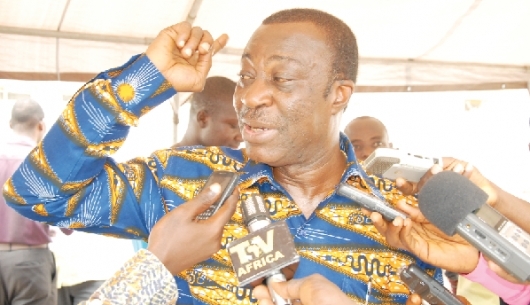
The New Patriotic Party (NPP) has warned that the deteriorated state of the economy, as a result of which the government is entering into negotiations with the International Monetary Fund (IMF), will inflict further difficulties on Ghanaians.
It said on the basis of the government’s reported economic data, it was clear that the country’s negotiators were severely handicapped.
It recalled that in February this year, an IMF mission visited Ghana and subsequently presented preliminary findings on what the fund thought ought to be done to revive the ailing economy, but the government dismissed those suggestions by the IMF.
“Remember that in February the IMF team had made certain proposals when the economic situation was not as dire. We cannot imagine that the new proposals from the fund will be less stringent than earlier ones,” it said.
At a press conference which was addressed by the Minority Ranking Member on Finance and Member of Parliament (MP) for Old Tafo, Dr Anthony Akoto Osei, the party said if the government had listened to good advice, the country would not have found itself in the current predicament.
“The unfortunate thing is that all of us Ghanaians will have to pay a higher price for what the government failed to do, for reasons best known to it,” it said.
It, however, called on the government to negotiate an IMF programme that would not inflict further hardships on Ghanaians who had already suffered enough from “incompetence and mismanagement” over the past six years.
More suffering
It expressed the hope that whatever agreement would be reached with the IMF would protect jobs, reduce the cost of doing business and support the transformation of the country’s economy.
According to the party, while negotiations would initially focus on expenditure rationalisation and revenue mobilisation measures, there would be discussions on sectoral issues which would affect expenditure or revenue or both.
It, therefore, identified three areas that would be critical to the negotiations — the Millennium Challenge Compact 2 (MCC-2), loans in the pipeline and the automatic adjustment formula in the petroleum sector.
According to the party, Ghana recently signed a grant agreement with the Millennium Challenge Corporation (MCC) in which the government expects to receive US$498.2 million, saying that in return, the government must fulfil certain conditions, some of which would directly have an impact on a possible programme with the IMF.
It said the government must put forward a credible plan to pay all the old arrears owed by its agencies to the Electricity Company of Ghana (ECG) and the Northern Electricity Distribution Company (NEDCo) prior to the coming into force of the compact.
The debt, it said, ranged between US$300 and US$500 million, for which the IMF team would likely engage the government in the robustness of the plan to ensure consistency.
Also, it said, the Public Utilities Regulatory Commission (PURC) must adhere strictly to the proposed quarterly adjustment in electricity tariffs to ensure the financial viability of the ECG and NEDCo.
Ghana, it said, currently had at least three loans in the pipeline and, in its opinion, the IMF would be interested in engaging government on those loans. They are the US$3 billion Chinese loan, the VTB Capital Loan of US$300 million and the US$1 billion Eurobond issue.
Although the government had announced its commitment to an automatic petroleum adjustment formula to eliminate subsidies in the sector, the evidence available, according to the NPP, suggested otherwise.
Source: Graphic


